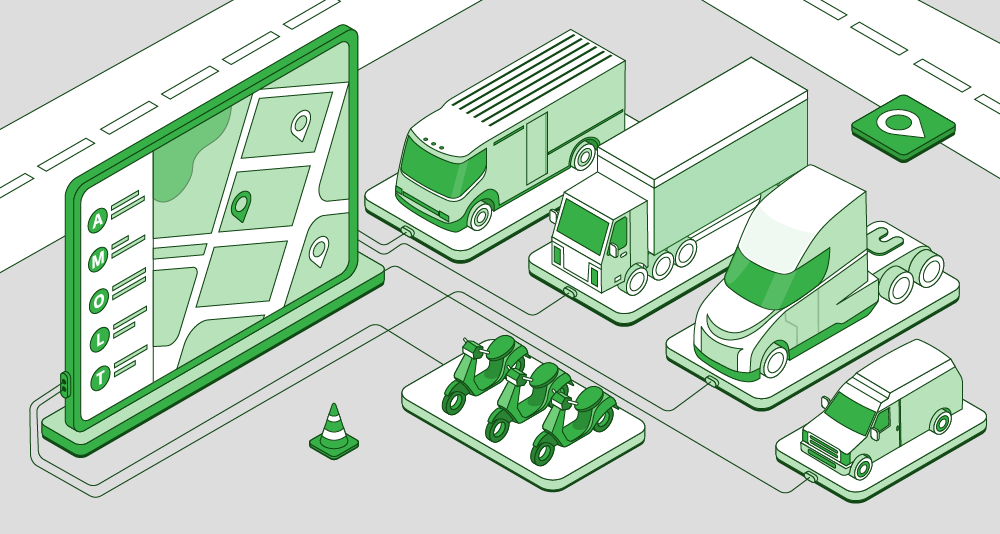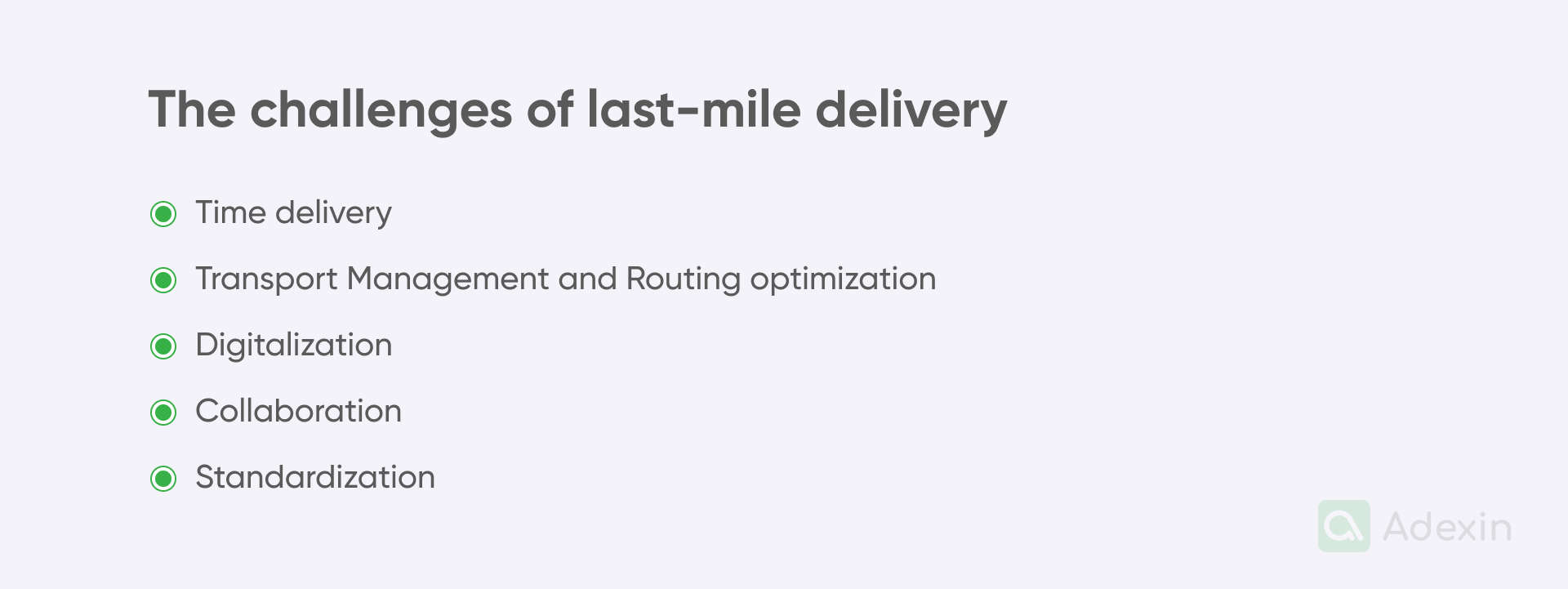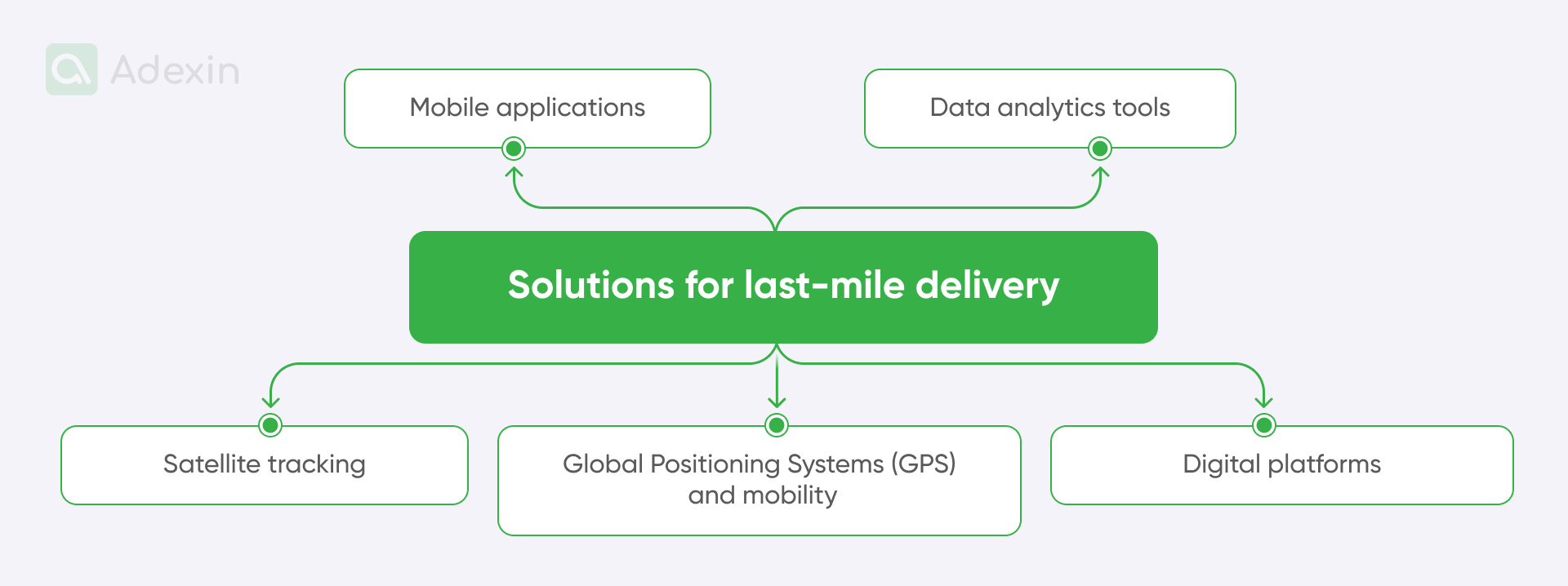Look inside at the challenges of last-mile delivery logistics and the latest technology solutions. Take a journey with us to see different aspects of digitization for just-in-time delivery. Learn how innovation is changing the industry. See how modern GPS solutions, satellite tracking, mobile apps, and data analytics for efficient last-mile services are changing the game. Get ahead of the competition and become a leader in the transportation industry.
How to unlock the success at the last stage: The key role of deliverability
The logistics industry primarily intermediates products between consumers and sellers. This fact implies diverse performance capabilities measured through deliverability and fulfillment. These two factors have become essential, if not critical, parts of today's retail chain.
Why is deliverability and fulfillment important for last-mile delivery?
Retailing is now bringing to the logistics a broad and complex landscape that involves multiple challenges arising from exceptional characteristics. One of those characteristics is the last-mile delivery element, where delivery and fulfillment play a crucial role in enhancing higher customer satisfaction.
This element of the retail business evolves further challenges that are much easier to tackle with contemporary digitally based technology solutions. It's about information sharing empowered by IT innovations, which now can allow for collaborative planning, forecasting, and replenishment at any time. These features gear benefits for all intermediates along the supply chain. But, the most significant advantage is strategic supplier relationship management, which mitigates unpredictable negative consequences of lower market demand and develops long-term strategies to reduce transport externalities. [1]
In simple words, if your online store has encountered a drop-down in shipping and you're forced to limit your warehouse operations along with decreasing truck drivers' routing, you can prevent wasting money using digital solutions. You'll be able to manage your warehouse inventory more reliably. If you're a transport manager, you'll have better insights into your network to rotate your truck fleet more consciously by seeing market opportunities that will allow you to take steps on quick replenishment.

What is the last-mile delivery?
Last-mile delivery is a term related to the shipping process for products and services to the destinations stipulated by their online customers. This delivery format has specific requirements for solutions related to omnichannel and the so-called quick commerce. The last mile logistics is one of the latest stages in the retail process and causes up to 28% of total delivery costs. Today, last-mile delivery services are adopting innovative technologies, strategies, and modern organizational models to improve efficiency. [1]
The biggest pioneers in this logistics area are retail masters, where companies such as Amazon, Alibaba, Uber Eats, European Tesco, or another US giant, Walmart, drive market changes. Those companies adopt various digital solutions, deploying advanced in-store mobile technologies and platforms.
One of the most popular approaches utilized by Amazon for last-mile delivery is innovative technology embedded into platform-based retail systems, which maintain their competitive positions and bring significant value to prosperity through digital access to their products and services, simultaneously allowing for real-time tracking of overall operations both by customers and sellers themselves. The increased need for digital technologies dedicated to last-mile delivery services, as on-demand delivery platforms are showing, is that the market is requiring adaptable solutions that can handle commonly known challenges in last-mile logistics.
5 last-mile delivery challenges

The challenges for last-mile delivery logistics are not much different from those for the entire supply chain. It's all about interacting smoothly and efficiently to provide a good moment of service for its customers. Participation in the delivery industry brings considerable issues for many sellers. Here are some of the challenges:
1. Time delivery
The logistics ecosystem is based on ensuring customer satisfaction. In the supply chain, it's greatly important to provide products on time, especially when it's about delivering services for manufacturing in the food industry. Otherwise, it can be very costly due to the extra fees and penalties for late delivery and wasted products (by late-delivered seafood). [2]
The same aspect is touching the retail chain, but here, there are no applicable financial penalties, but very often, late delivery causes direct customer losses. It is clear for most of us that high competition in the market makes each customer more valuable, especially when selling premium goods. Therefore, in the long term, losing customers due to late delivery is much more harmful, as they may never come back again.
2. Transport Management and Routing optimization
Last-mile delivery logistics is an area that is perceived as an ever-evolving environment due to its high fluctuation caused by the retail market. Retailers are exposed to many ups and downs; therefore, they are challenged by the constant need for optimization in transport management and finding the most suitable routes.
Lack of features such as real-time data, dynamic route planning algorithms, effective fleet management solutions, or basics such as tracking devices (typical GPS technology) are causing tremendous problems and can be very costly due to product losses. The optimization strategies, such as smart traffic management, can be applied to the entire logistics, helping with forecasting and decision systems.
Need help with custom fleet management solution?
We are happy to support you
Explore more3. Digitalization
Digital infrastructures are crucial for last-mile delivery and transport management. It enables various stakeholders to do business more proficiently. Lack of mobility constraints companies in fluent data exchange, causing poor communication and increased customer dissatisfaction. Two-way communication and better traceability of shipments are crucial to ensure fast, transparent, and convenient networks.
Digitalization is progressing in every industrial sector, and last-mile delivery logistics are a vast part of various industries. It combines heterogeneous technologies that depend on embedded software, even in such obvious cases as document management, an area where digitalization is going forward to minimize costs, particularly paper documents. These can reach up to 3% of a company's revenues, no matter which size.[3]
4. Collaboration
The business process for last-mile delivery requires consolidation and synchronization of existing resources. The lack of necessary features can lead to undesirable effects and higher freight transport costs. It also boils down to insufficient resource management when it comes to transportation. Due to the interconnected networks of today, logistics companies that cannot manage their truck fleets efficiently cannot increase awareness about user-specified constraints and construct the actual routes that lead to lower fuel costs.
Collaboration is also about data visibility, as many logistics companies, due to their high warehouse traffic, are implementing time delivery windows. This only allows drivers to deliver their consignments after the scheduled time slot. As a result, they're often forced to wait for another free time slot for unloading, which can last until the next day. It's obviously additional costs for the carriers, as not many companies can afford to simply reroute shipments in far locations.
5. Standardization
Everyone should get the right data on time in the right place. If a company is growing, standardization is a constant challenge, too. Therefore, providing customers with faster information flows and traceable shipping details gives them more convenient and accurate services. For this reason, companies should have standardized systems that help connect everyone, delivering an unchanged level of information. Whether it's a truck driver or a customer expecting to receive a package ordered online, they should know about each other's location to feel comfortable and to provide error-less last-mile delivery service.
Furthermore, alternative solutions towards standardization, for example, in e-commerce models such as online marketplaces, could account for 10% - 30% of the market share by 2030. Standardization can be useful in rotating goods while reselling previously owned, presumably used products through online distribution. This instant advantage can be achieved only when all parties are fed with shared market information. [4]
What are the solutions for last-mile delivery?

Together with the progress in logistics and distribution, more and more solutions appear that help handle day-to-day last-mile delivery operations. However, the most commonly known and already in-use solutions are connected to four areas. Here are four digital technology solutions that can be adapted to your last-mile delivery logistics:
Solution | Description |
|---|---|
Despite those solutions, many logistics companies are investing in electric L-category Vehicles (EL-Vs), fulfillment centers (FCs), and delivery hubs such as Pick-up/Drop-off that allow local communities in urban areas to effectively collect and return their orders. Click-and-collect service providers handle online returns and enable customers to send out small-pack parcels through community-based services. These systems were implemented first by the Polish InPost Company and have been adopted by many logistics operators, such as DHL, for customer deliveries worldwide. [5]
Are you in search of a reliable tech partner?
Adexin can help with advanced logistics solutions
Contact usFinal thoughts
The last mile delivery services are very important to provide convenience to the customers. It mainly requires adopting agile techniques and technologies that can accelerate speed to market.
As digital interactions are crucial between various parties in the supply chain, the demand for mobile applications and digital platforms is constantly growing. The digital shift to mobile apps and platforms in your business can bring incremental benefits through lower costs and more effective asset management, together with better utilization of your employees' working time.
Looking through the costs of mobile app development or platforms with embedded features such as GPS traceability or data analytics tools can provide your turnover in months. You can evaluate your costs based on reliable return on investment (ROI).
Adexin is the market leader in developing solutions for the transportation industry that support the requirements of last-mile delivery logistics. We know how to help you on the digital transformation journey, as we already have similar cases in our portfolio for companies based in the UK or the US. Do you want to know more about how we can help you with your logistics? Visit Clutch to see us on top of the rankings for the best prices and reliability in logistics solution delivery. Contact us today, and let's book a time slot for a short talk about your business needs.
References:
[1] A Review of Last Mile Logistics Innovations in an Externalities Cost Reduction Vision, retrieved from: https://www.mdpi.com/2071-1050/10/3/782
[2] The last mile challenge: Certified seafood and federal labeling laws out of sync at the end of the supply chain in Los Angeles, California. Marine Policy; retrieved from: https://www.sciencedirect.com/science/article/abs/pii/S0308597X20310319
[3] The True Cost of Paper in Your Business Operations; retrieved from: https://www.linkedin.com/pulse/true-cost-paper-your-business-operations-joe-alvarez/
[4] Fashion’s digital transformation: Now or never; retrieved from: https://www.mckinsey.com/industries/retail/our-insights/fashions-digital-transformation-now-or-never
[5] Analysis of Parcel Lockers’ Efficiency as the Last Mile Delivery Solution – The Results of the Research in Poland, retrieved from: https://www.sciencedirect.com/science/article/pii/S2352146516000193

